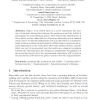Free Online Productivity Tools
i2Speak
i2Symbol
i2OCR
iTex2Img
iWeb2Print
iWeb2Shot
i2Type
iPdf2Split
iPdf2Merge
i2Bopomofo
i2Arabic
i2Style
i2Image
i2PDF
iLatex2Rtf
Sci2ools
122
click to vote
QI
2015
Springer
2015
Springer
Do Preferences and Beliefs in Dilemma Games Exhibit Complementarity?
Abstract. Blanco et al. (2014) show in a novel experiment the presence of intrinsic interactions between the preferences and the beliefs of participants in social dilemma games. They discuss the identification of three effects, and we claim that two of them are inherently of non-classical nature. Here, we discuss qualitatively how a model based on complementarity between preferences and beliefs in a Hilbert space can give an structural explanation to two of the three effects the authors observe, and the third one can be incorporated into the model as a classical correlation between the observations in two subspaces. Quantitative formalization of the model and proper fit to the experimental observation will be done in the near future, as we have been given recent access to the original dataset.
| Added | 16 Apr 2016 |
| Updated | 16 Apr 2016 |
| Type | Journal |
| Year | 2015 |
| Where | QI |
| Authors | Ismael Martínez-Martínez, Jacob Denolf, Albert Barque Duran |
Comments (0)

